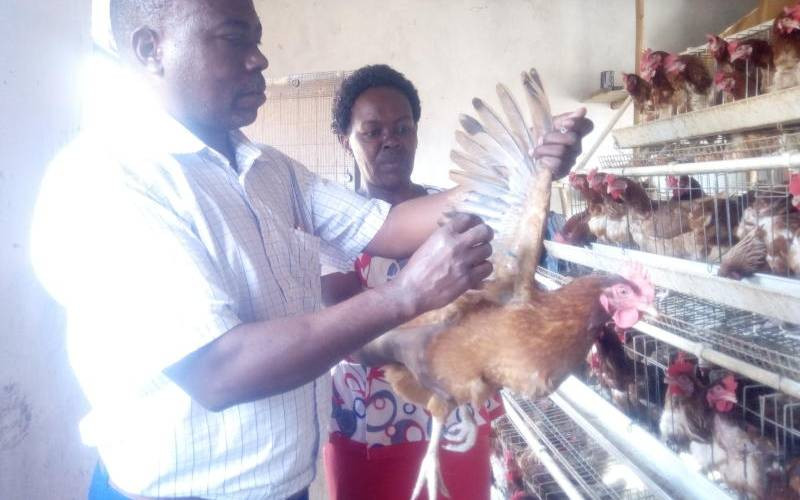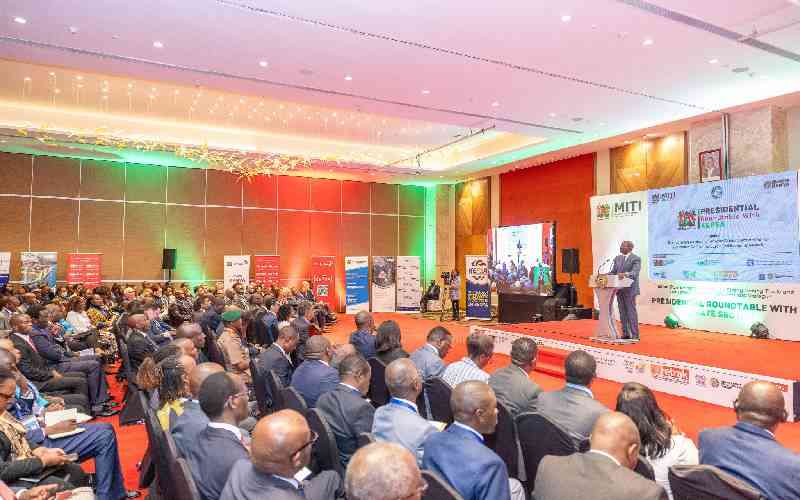
For smallholder farmers, generating meaningful returns from agriculture can be challenging, particularly in the face of the growing impacts of climate change.
This calls for the adoption of climate-smart farming techniques to make agriculture more sustainable and resilient.
Vihiga County, which is largely agricultural and dominated by smallholder farmers who rely on their farms for both food and income, is one of the areas in need of these climate-smart solutions.
As land sizes continue to shrink and the cost of farm inputs rises, the use of organic manure is emerging as a sustainable alternative to synthetic fertilisers.
Experts are now advising farmers to embrace organic fertilisers—particularly those made from livestock manure—as a more accessible and cost-effective solution.
One farmer’s plot in the Majengo area has now become a model farm, attracting other smallholder farmers eager to learn how to maximise productivity through mixed farming.
Francis Ominde has transformed his half-acre farm into a thriving model of sustainable agriculture using organic fertilisers derived from pig and cow manure mixed with plant residues.
“I relied heavily on synthetic fertilisers for over a decade, but I made the switch last year when I started keeping pigs and cows,” says Ominde.
Ominde, a governance expert turned agroecological farmer, says the prolonged use of synthetic fertilisers weakened his soil structure, leading to declining harvests.
It wasn’t until he learnt from a friend about the use of organic manure that things began to change.
He now uses organic fertilisers in plenty and only complements them with a small portion of chemical fertilisers in an Integrated Soil Fertility Management (ISFM) system.
“For the last three planting seasons, I have relied heavily on manure and less on synthetic fertilisers,” he explains.
The difference is clear—in the last two years, he has harvested between 15 and 18 bags of maize per season from just half an acre, compared to previous years when he barely managed three bags using only synthetic fertilisers.
Stay informed. Subscribe to our newsletter
In addition to maize, Ominde grows a wide range of African leafy vegetables, including African nightshade, leafy amaranth, spider plant, cowpeas, Ethiopian kale, mitoo (slenderleaf), jute plant, and pumpkin leaves.
With an initial investment of Sh10,000, Ominde now earns regular income while also giving surplus produce to visiting farmers who come to learn from his techniques.
“The market for African leafy vegetables is massive. I sell to local vendors who supply major towns. But my main goal isn’t just profit; it’s teaching other farmers how to benefit from small pieces of land,” he says.
Ominde walked us through his compost-making process, which has become a daily routine on his farm.
With close to 100 pigs and several cows, he collects droppings from the pigsty and cow byres and feeds them into a biogas digester. The digester produces clean cooking gas for his home.
“After the gas is extracted, the fun part begins,” he says with a smile. “I use the remains as manure on my farm.”
The digester residue is then transferred into a compost pit, where he adds dry leaves, crop residues, and kitchen waste. To accelerate decomposition, he introduces microbes by adding topsoil or previously matured compost.
“Every morning before feeding the animals, I collect the fresh waste. Composting is now part of my daily schedule,” says Ominde.
He maintains compost quality by turning the pile weekly to allow aeration, control heat, and prevent foul smell.
He also manages moisture levels, sprinkling water when too dry, and adding dry matter like sawdust when too wet. After two to three months, the compost matures into dark, crumbly, and earthy-smelling material ready for use on his farm.
Ominde says the benefits of using manure are clear: healthier crops, improved soil moisture retention, and steadily increasing yields.
“Organic farming significantly improves soil fertility by increasing levels of calcium, magnesium, potassium, and pH,” he explains.
“In conventional farming, you have to buy those nutrients, something that’s not sustainable.”
His farm has now become a model training site for other farmers in the region. Currently, over 50 farmers in Vihiga have adopted composting and manure use after learning from him.
“I voluntarily give one or two sacks of ready compost to farmers around me to help them revive their soils,” Ominde says.
His next plan is to begin selling the excess compost at affordable rates.
While a 90kg bag of well-composed manure can go for as much as Sh1,000 in the market, Ominde offers a full truckload for just Sh5,000.
“But selling is not my main goal. I want to share knowledge with every willing farmer,” he emphasises.
Vihiga County currently lacks a full agricultural training institution, making resourceful farmers like Ominde crucial in promoting climate-smart farming practices.
Henry Kivai, a budding farmer learning from Ominde, says the absence of such institutions has left many farmers stranded, especially since agriculture is a devolved function.
“We are forced to learn from other successful farmers like Ominde, since accessing formal training means going as far as Bukura Agricultural Training College in Kakamega or Nandi,” says Kivai. Experts agree that what Ominde is doing is a textbook example of smart farming techniques that smallholder farmers should embrace.
“Properly managed manure improves soil structure, boosts water retention, and supplies essential nutrients—cutting the need for synthetic inputs,” says Caleb Amendi, an agricultural expert.
Amendi argues that manure use is a climate-smart farming practice as it promotes carbon sequestration by increasing organic matter in the soil and reduces greenhouse gas emissions associated with chemical fertilisers.







